

Dunning's History Now - July 2005
AFRICA'S COMING TO DUNNING

Writing about the coming G8 Gleneagles Summit, Guardian columnist Madeleine Bunting remarked June 20/05 on "... the increasingly embarrassing problem that African voices are virtually non-existent---not just their bizarre omission from Live 8, but everywhere: this is the rich north talking to itself about another continent's future. That is mighty lopsided."
As it happens, the village of Dunning, Perthshire, seven miles from Gleneagles, will be providing one small forum for African voices from June 28-30. It's being billed as the Dunning Summit.The event has been planned for months by a group of villagers who feel the only way we can ever get the truth about Africa (short of going there ourselves) is to talk directly to a cross-section of Africans.About twenty Africans, from eight nations, have accepted invitations to stay in villagers' homes, to eat home-cooked meals provided by villagers, to participate in community events like a ceilidh and barbecue, and to meet with peer groups like farmers, women, church members and business people to share their life experiences and information about their countries. At the end of the meetings, villagers will put on paper what they've learned from their meetings, and, for the sake of any cameramen watching, the written communique will be carried by bicycle to the G8 secretariat at Gleneagles by Auchterarder's cycling bobby, Constable Fraser White. We've been assured the message will be accepted.
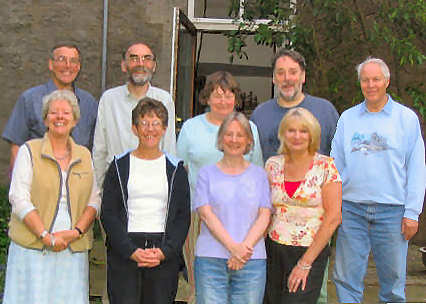 The committee. |
Raymond Young, coordinator of the Dunning Summit, says "Although we see pictures from Africa on a regular basis, and many of us have vague links through various fund raising agencies and friends who have visited, we really do not know much about the lives of ordinary folk living in this vast continent. The Dunning Summit has been created to give us some insight into African life.
"Our guests are already in this country, with agencies such as Christian Aid, and the Church of Scotland, and as asylum seekers and students. We have received funding towards the costs of bringing and hosting them from several levels of government and from private donors.
"We have planned our summit for the week preceding the actual summit in case access around the village is difficult during the July week, and also because the school will break up for the summer holidays that week and we would like to offer this educational opportunity to our young folk.
Adds Raymond Young: "There is no truth to the rumour that we have to hold our event a week before the G8 Summit to give Constable White enough time to cycle to Gleneagles!"
---Lorne Wallace June 2005
SO HOW DID THE DUNNING SUMMIT TURN OUT?
To judge by the feelings of the participants and the response of the public and the media, the Dunning Summit was an astounding success. "It went," said organiser Jean Young, "far, far beyond our expectations".
There had been some major obstacles to overcome. First there was some local doubt about the value of the event, but the unreserved support of the school, church, police and government as well as word of mouth and a newsletter to every home helped overcome this.
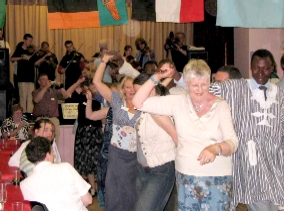 Finella and Jonas dance at the ceilidh. |
Then there was uncertainty to the last minute about which visitors could attend because of visa and travel problems. However, in the end seventeen delegates from nine African countries (all of them already in this country) arrived and stayed with villagers (and four groups of African and Scottish musicians attended too).
Finally, on the very eve of the Summit, came what could have been a huge setback. Co-ordinator Raymond Young was struck by a serious illness. Fortunately, his wife Jean stepped in smoothly and bravely to take Raymond's place, and he is now recovering after three weeks in hospital.
Looking back over the three day event, Anne Myles, a local shopkeeper and farmer who contributed generously to the event (as did many others), summed things up this way: "The Summit was absolutely fantastic. My husband David and I felt it was a real privilege to meet and talk with the African visitors".
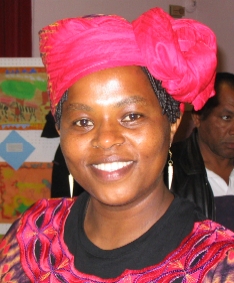 Faith Kanunu |
Visiting Kenyan teacher Faith Kanunu spoke of the "great and wonderful event you organised in your village. I felt honoured to be part of the Dunning Summit, and all the African visitors were very pleased by what you did towards making poverty history in our continent and for your hospitality and love too!"
Faith added "Though Dunning is a small village the idea was big and the resolutions made and presented to the G8 were at the international level".
Brian Henderson of Wester Clevage led a tour of local farms with farmer visitors from Burkina Faso and Zimbabwe. Writing in The Scottish Farmer magazine afterwards, Brian said "We may worry and complain about our own difficulties, but the problems expressed by these guys puts things into perspective. And talking to them was worth a thousand politically spun soundbites."
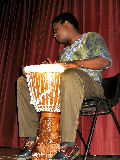
The first day of the Dunning Summit was highlighted by a visit of the Africans to Dunning Primary School. BBC Scotland Newsnight and BBC World Service Radio attended too, as they did later the dinner and a lively ceilidh which featured Scottish fiddlers and bagpiper and an African drummer. The Village Hall had been beautifully decorated with children's art and huge flags from the participants' countries.
The second day featured group discussions on issues like health, women's problems, education, trade and agriculture. Late in the afternoon, a plenary session brought together the major points raised by the groups, and these were incorporated in a Dunning Declaration to be carried to the site of the G8 meeting by our cycling bobby.
About this time another (rather eminent) supporter of the Dunning Summit had made himself known. Prime Minister Tony Blair (or at least his office) announced he wanted Constable Fraser White to deliver the Dunning Declaration not to the G8 secretariat at Gleneagles but instead to hand it to him personally at Downing St. at 3:45 pm the next day!
Accordingly, the Thursday schedule was rearranged. After a parade of flags, children and delegates from the Village Hall to Tron Square, the Dunning Declaration was read aloud by Jean Young. Then, for the benefit of the media cameras, Constable White pedalled off around the corner. Out of sight, he hopped into a police car that took him to Edinburgh Airport. Hours later, the cameras caught him at No. 10 Downing St., handing the Dunning Declaration to Mr. Blair.
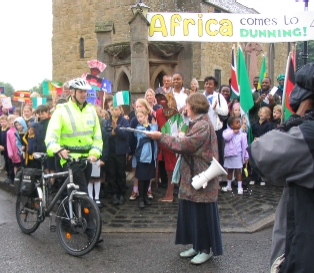 |
 Fraser takes the Declaration and gives it to Tony Blair. |
This blaze of unexpected publicity aside, it was the warm contact with the individual Africans which made the Dunning Summit such a success with all of us who participated. My wife Patricia and I will always remember the conversations we had with our house guest Hassan, a young fisherman from Somalia forced to flee that lawless country alone when his family was murdered by the warlords. After being helped for several years as a refugee first in Kenya and then in Glasgow, Hassan told us he is studying now to repay that help by becoming a social worker.
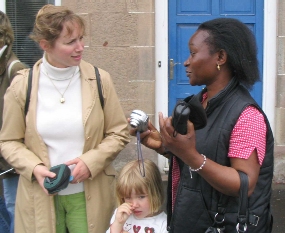 Friendships formed: Lorna Radbourne and Gloria Etim |
A young local couple, Lorna and Alistair Radbourne, were keen to offer a bed to a Dunning Summit visitor, but their cottage is small and their worry was that the bed they were offering would have to be a small children's size (their two children would sleep together on the other child's bed for the occasion). Fortunately, their assigned visitor, a Nigerian human rights lawyer, Gloria Etim, turned out to be diminutive in stature. Gloria has been taking her masters degree at the University of Dundee. It soon became evident that a strong friendship has been struck up between her and the Radbournes.

Ibrahim Suliman, a refugee from the Sudan, said after the Summit was over, "I never thought I would be walking in a parade behind the flag of my country and it would be carried by white children. I felt so proud."
Did the African visitors make an impression? Radio reporter Madeleine Morris of BBC World Service told of recording an interview with a Dunning school child who earnestly told her "You know, when I grow up, I want to be an African."
Reporter Morris herself seems to have been impressed by her experiences over the three day Dunning Summit. In an email to the organisers afterwards, she thanked everyone for the help she had received and ended "I wish I lived in Dunning."
---Lorne Wallace July 2005
To view the Dunning Declaration click here.